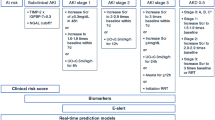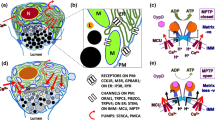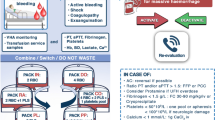Abstract
Acute pancreatitis can develop in patients with shock due to the underlying diseases, surgical interventions or because of severe hypoperfusion. The aim of our work was to study the histological alterations of the pancreas in patients dying after cardiogenic, hypovolemic or septic shock, to demonstrate the presence and severity of pancreatic injury. We performed a retrospective study which included patients who died and who were autopsied after different types of shock, hospitalized between 2007–2009 in general and cardiac intensive care units. We excluded the patients with known pancreatic diseases. From 223 patients included in our study 39 presented necrotising hemorrhagic alteration of the pancreatic tissue. There were no differences in histological and immunohistochemical findings between the different etiopathogenetic types of shock. None of the patients had characteristic clinical signs for acute pancreatitis. The digestive symptoms, they presented, could be related to the underlying disease or to postoperative state. The common findings in these patients were prolonged and severe hypotension, associated renal dysfunction, leucocytosis, hyperglycemia and hypocalcemia. Pancreatitis can occur in patients with shock, due to prolonged hypoperfusion of the pancreas. It is difficult to diagnose it because clinical signs are altered due to severity of underlying disease or analgo-sedation commonly used in intensive care. We therefore recommend in patients with shock to consider the possible development of ischemic pancreatitis for prompt and efficient treatment.




Similar content being viewed by others
References
Piton G, Barbot O, Manzon C et al (2010) Acute ischemic pancreatitis following cardiac arrest: a case report. J Pancreas (Online) 11(5):456–459
Hackert T, Hartwig W, Fritz S et al (2009) Ischemic acute pancreatitis: clinical features of 11 patients and review of the literature. Am J Surg 197(4):450–454
Sakorafas GH, Tsiotos GG, Sarr MG (2000) Ischemia/reperfusion induced pancreatitis. Dig Surg 17:3–14
Schmitz-Moorman P (1981) Comparative radiological and morphological study of the human pancreas. Acute necrotising pancreatitis in man. Path Res Pract 171:325–335
Dugernier T, Laterre PF, Reynaert MS (2000) Ascites fluid in severe acute pancreatitis: from pathophysiology to therapy. Acta Gastroenterol Belg 63(3):264–268
Nordback I, Lauslahti K (1986) Clinical pathology of acute necrotising pancreatitis. J Clin Pathol 39:68–74
Warshaw AL, O’ Hara PJ (1978) Susceptibility of the pancreas to ischemic injury in shock. Ann Surg 188:197–201
Warzecha Z, Dembinski A, Ceranowicz P (2004) Immunohistochemical expression of FGF-2, PDGF-A, VEGF and TGF beta RII in the pancreas in the course of ischemia/reperfusion-induced acute pancreatitis. J Physiol Pharmacol 55(4):791–810
Nandy D, Mukhopadhyay D (2011) Growth factor mediated signaling in pancreatic pathogenesis. Review. Cancers 3:841–871
UedaT TY, Yasuda T (2006) Vascular endothelial growth factor increases in serum and protects against the organ injuries in severe acute pancreatitis. J Surg Res 134(2):223–230
Beere HM, Wolf BB, Cain K et al (2000) Heat-shock protein 70 inhibits apoptosis by preventing recruitment of procaspase-9 to the Apaf-1 apoptosome. Nat Cell Biol 2(8):469–75
Bhagat L, Singh VP, Song AM et al (2002) Thermal stress-induced HSP70 mediates protection against intrapancreatic trypsinogen activation and acute pancreatitis in rats. Gastroenterology 122(1):156–65
Ethridge RT, Ehlers RA, Hellmich MR et al (2000) Acute pancreatitis results in induction of heat shock proteins 70 and 27 and heat shock factor-1. Pancreas 21(3):248–56
Geissler HJ, Fischer UM, Grunert S et al (2006) Incidence and outcome of gastrointestinal complications after cardiopulmonary bypass. Interact CardioVasc Thorac Surgery 5:239–242
Munoz A, Katerndahl DA (2000) Problem-oriented diagnosis. Diagnosis and management of acute pancreatitis. Am Fam Physician 62:164–74
Wan S, Arifi AA, Chan CSY et al (2002) Is hyperamylasemia after cardiac surgery due to cardiopulmonary bypass? Asian Cardiovasc Thorac Ann 10:115–118
Butler J, Mackway-Jones K (2002) Serum amylase or lipase to diagnose pancreatitis in patients presenting with abdominal pain. Emerg Med J 19:430–431
Weir GC, Lesser PB, Drop LJ et al (1975) The hypocalcemia of acute pancreatitis. Ann Intern Med 83(2):185–189
Khan JH, Lambert AM, Habib JH et al (2006) Abdominal complications after heart surgery. Ann Thorac Surg 82:1796–1801
Perez A, Ito H, Farivar RS et al (2005) Risk factors and outcomes of pancreatitis after open heart surgery. Am J Surg 190(3):401–405
Del-Castillo CF, Harringer W, Warshaw AL et al (1991) Risk factors for pancreatic cellular injury after cardiopulmonary bypass. N Engl J Med 325:382–387
Kuo IM, Wang F, Liu KH et al (2009) Post-gastrectomy acute pancreatitis in a patient with gastric carcinoma and pancreas divisum. World J Gastroenterol 15(36):4596–4600
Blom RLGM, van Heijl M, Busch ORC et al (2009) Acute pancreatitis in the postoperative course after esophagectomy: a major complication described in 4 patients. Case Rep Gastroenterol 3:382–388
Acknowledgments
This paper is partially supported by the Sectoral Operational Programme Human Resources Development, financed from the European Social Fund and by the Romanian Government under the contract number POSDRU/89/1.5/S/60782 , and by CNCSIS-UEFISCSU, project number PNII - IDEI code 136/2008”.
Author information
Authors and Affiliations
Corresponding author
Rights and permissions
About this article
Cite this article
Kovacs, J., Gurzu, S., Jung, J. et al. Clinico-Pathological Particularities of the Shock-Related Pancreatitis. Pathol. Oncol. Res. 18, 977–981 (2012). https://doi.org/10.1007/s12253-012-9528-6
Received:
Accepted:
Published:
Issue Date:
DOI: https://doi.org/10.1007/s12253-012-9528-6




